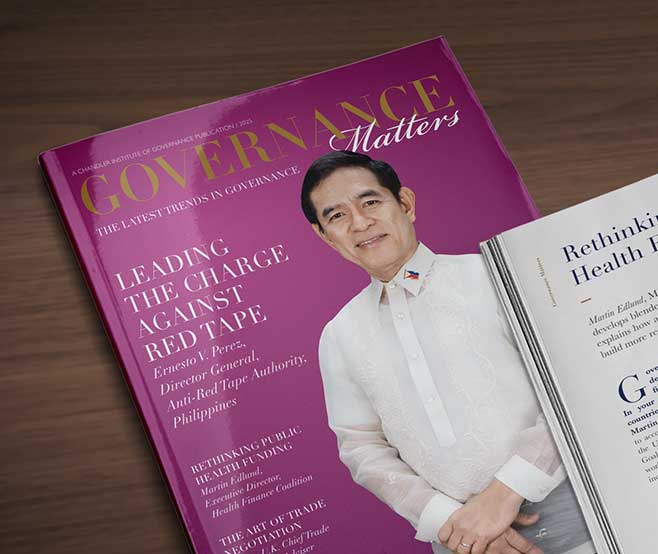Harmonising Emoluments Pays Off for Zambia
Linking performance and pay is crucial to the success and integrity of any civil service. Zambia’s first-of-its-kind Emoluments Commission is taking a lead in this crucial area of governance. Its Director General, Mwamba Peni, tells Governance Matters what he has learned about remuneration, capabilities, and the challenge of building a new organisation from the ground up.
Lorem ipsum dolor sit amet, consectetur adipiscing elit, sed do eiusmod tempor incididunt ut labore et dolore magna aliqua. Ut enim ad minim veniam, quis nostrud exercitation ullamco laboris nisi ut aliquip ex ea commodo consequat. Duis aute irure dolor in reprehenderit in voluptate velit esse cillum dolore eu fugiat nulla pariatur.
Heading 1
Heading 2
Heading 3
Heading 4
Heading 5
Heading 6
Lorem ipsum dolor sit amet, consectetur adipiscing elit, sed do eiusmod tempor incididunt ut labore et dolore magna aliqua. Ut enim ad minim veniam, quis nostrud exercitation ullamco laboris nisi ut aliquip ex ea commodo consequat. Duis aute irure dolor in reprehenderit in voluptate velit esse cillum dolore eu fugiat nulla pariatur.
Block quote
Heading 6
Ordered list
- Item 1
- Item 2
- Item 3
Unordered list
- Item A
- Item B
- Item C
Bold text
Emphasis
Superscript
Subscript
A meritocratic civil service is one of the pillars of good government. Effective government institutions reward integrity, competence, and achievement among their employees. Ineffective public services are those where career progress and reward reflect tenure, patronage, or political connections. This inbuilt malfunction both deepens inefficiency and heightens the risk of corruption – twin dangers that can hold any nation back.
In Zambia, the critical issue of civil service remuneration is the responsibility of a first-of-its-kind organisation. The country’s Emoluments Commission (EC) was established in 2022 in response to a comprehensive Government review of salaries that found shocking discrepancies. “Distortions were as high as 1,500% between the highest-paid CEO and the lowest-paid CEO of treasury-funded organisations,” the EC’s Director General, Mwamba Peni, told Governance Matters, “and the Government realised that this needed to be addressed.”
The EC identified three main reasons for the huge disparities in pay. “First, there is no unifying framework,” Peni said. “Different institutions are governed by different pieces of legislation and regulation and so they determine emoluments differently. Second, there were various differences about how pay was negotiated. Third, job evaluation, which is a cornerstone of equal pay for equal work of equal value, was not being conducted in most institutions. Emoluments were at the whim of the Minister or the official in charge, which was not fair or transparent and encouraged political patronage.”
The EC was handed a broad remit to reform this system. It was established under 2016 reforms to Zambia’s Constitution which were operationalised in 2022. The EC is responsible not just for pay but for every form of remuneration for public servants including allowances, benefits, pensions, and other rights. By benchmarking these emoluments, it can ensure that they are aligned between similar institutions within Zambia and, where appropriate, with their foreign equivalents. Under the terms of the parliamentary legislation that brought it into being, it is also responsible for helping Zambia’s institutions to “attract, retain, and motivate officers and staff” who have the right skills and experience to improve service delivery.
The EC casts its net wide across the public sector. Its remit includes the President and other members of the executive, parliamentarians, members of the judiciary, the civil service, the military, and employees of all state-owned enterprises including the central bank.
Following a Unique Approach
“We are taking a very different approach from, for example, Ghana,” said Peni. “Ghana’s Fair Wages Commission determines emoluments only for the mainstream civil service, not for Ministers and Members of Parliament. In South Africa, the Salary Review Commission focuses on the positions of office holders, but it does not make the final decision; it only advises the President. Kenya has a similar institution to the EC but they chose to leave senior government officials out of the equation. There is a good reason to do that. There is a lot of resistance when you set up an EC. Each and every institution has an excuse for why they should be able to continue setting their own levels and be exempt.”
Peni attributes Zambia’s success in bringing so many institutions under the umbrella of the EC to the strong consensus among the country’s leaders that fair emoluments are an important route to developing a highly-functioning civil service. “What really mattered for us was leadership. We had the political will from the very top and we had a very clear way of framing things,” he said. “When people work for the Zambian civil service, their pay cheque and other benefits come from public funds. That money belongs to the people of Zambia who are, in effect, the shareholders of the institutions. They deserve to have their money used wisely, no matter which institution it is. That is why we decided to take a comprehensive approach that is the first of its kind in Africa, if not the world.”
When civil servants are rewarded for their hard work and good performance, they are more likely to be motivated and committed to their jobs.
Difficult Conversations
Political leadership and a strong sense of mission are vital in building strong institutions, but they are far from a guarantee of success. In its early days, the EC faced a number of challenges. “Linking the performance of civil servants to pay is one of the most difficult conversations in the public sector,” said Peni. “In my opinion, it is really important, because it can help improve the quality of public service and reduce corruption. When civil servants are rewarded for their hard work and good performance, they are more likely to be motivated and committed to their jobs.”
To anticipate any objections, Peni emphasised the obligation to make sure that the system is fair. “This starts with ethical and strong leadership, but it also needs clear performance metrics, regular evaluations, and opportunities for employees to improve their performance,” he said. “We work to provide training and support to employees to help them meet performance expectations.”
Measuring the performance of one department or even the members of one institution is one thing. The EC has to look across the whole of Zambia’s civil service. For Peni, the key is understanding the purpose of the institution and ensuring that emoluments are linked to achieving that purpose. “Take the Ministry of Lands and Natural Resources. To measure their performance, we would look at something like how long it takes to receive a title deed when you apply for one,” Peni said. “Whoever we are looking at, everything has to come back to the capacity and ability to deliver services for the people of Zambia. This can be done internally when we have established a performance measurement system. We also encourage service users to provide feedback.”
In practice, every year, whenever there is a review, the Commission in question – which could be the Public Service Commission, the Civil Service Commission, the Teaching Service Commission, or whichever commission is relevant – recommends its proposed changes in the remuneration structure. The EC then has to evaluate and determine any changes.
Designing an Organisation from Scratch
Establishing a new organisation is never straightforward. The creation of the EC sparked a rapid period of competence-building and organisational design as Peni and his team sought to establish the skills and capabilities required for their mission. “We needed to understand the field of remuneration and compensation,” said Peni. “What is fair? We are not there to make all salaries uniform; we are there to ensure equal pay for equal work of equal value. We need to be able to classify jobs and compare and set standards. Then you need legal and regulatory capabilities. Are we complying with our laws, and are we in line with our international obligations? For example, Zambia is a signatory to the International Labour Organization, which has stipulations around trade unions, workplace safety, gender equality, and other standards that we want to remain compliant with.”
This process also requires forecasting, financial, and actuarial skills. “On an institutional level, a lot of emoluments work is forecasting, because the people running each organisation need to know what their wage bill is going to look like,” said Peni. “We also must look at it on the national level to make sure we do not collapse the social security system and that the civil service wage bill is not becoming too high a percentage of our resource mobilisation capacity.” Acknowledging how complicated the situation is, Peni added, “In Zambia, somebody’s pension is related to their last drawn salary. If pay changes we need to think about what that will do to the national pensions bill in the long term.”
Then comes the issue of the softer skills needed in the civil service. Peni is concerned with what motivates employees and understands that beyond the salary, many factors are important, including the work environment, opportunities that employees have, leadership, and other related issues. “We have already talked about resistance, but we need to be able to bring stakeholders with us. That needs communication and interpersonal skills,” he explained. “I personally meet board members on a weekly basis. So far I have met more than 50 board chairpersons from the over 200 state-owned enterprises and statutory bodies that fall under the EC. This is to explain what the EC is and what we are hoping to achieve. We also have to reach out to the labour unions which can be sceptical of our work as well.”
For a young institution, establishing these skills has been a challenge. “It has been difficult but we needed to get going or the whole thing would have come to a standstill,” said Peni. “The Emoluments Commission Act that established the EC came into law and we could not stand around waiting until everything was perfect before we started our work. This has made organisational design a very important priority for us. To help us, we have looked closely at other examples and also leveraged our contacts to learn from the experience of others.”

Building a Fairer Public Sector
The EC is a young organisation, but it is already accumulating stories of success. In one institution, the EC found that although management enjoyed fair wages, employees lower down the scale were being under-paid. Despite management attempting to delay the process, the EC was eventually able to harmonise their remuneration with others in a similar position.
“After we had completed the process, I met one union leader,” said Peni. “He hugged me and said, ‘We are so happy. We thought the EC was an animal, which was there to infringe on the rights of employees to collective bargaining. We thought it was meant to come and reduce our conditions. We did not know that this institution was coming to bring some level of fairness.’”
We are not there to make all salaries uniform; we are there to ensure equal pay for equal work of equal value.
Another early success came with a university which is self-sustaining and generates its own revenue. “The school of agriculture is selling honey they are harvesting; the school of fisheries is able to sell fish from their ponds; even the veterinary department is selling retail products and services,” Peni said. “When we went in, we found that their wage bill was only equivalent to 10% of their profit. That was wrong. They needed to pay more to attract talent and motivate the staff which is important if we are to have strong research institutions, and it could easily be justified because they were not relying on taxpayers.”
Peni observed that with the EC’s growth, they are getting more feedback, and more people are seeing how they work and coming to understand the EC. “When we talk to people, we always keep at the back of our mind that we are doing this for the people of Zambia,” he said. “When the workers deliver value, there is more money to employ teachers, nurses, and agricultural extension officers, who are the key intermediaries between farmers and policymakers, as well as researchers. When employees deliver value, there is more money to improve the condition of services for all the people who are employed in public institutions. When employees deliver value, there is more economic development. The winners, ultimately, are the workers and the people of Zambia.”

Heading 1
Heading 2
Heading 3
Heading 4
Heading 5
Heading 6
Lorem ipsum dolor sit amet, consectetur adipiscing elit, sed do eiusmod tempor incididunt ut labore et dolore magna aliqua. Ut enim ad minim veniam, quis nostrud exercitation ullamco laboris nisi ut aliquip ex ea commodo consequat. Duis aute irure dolor in reprehenderit in voluptate velit esse cillum dolore eu fugiat nulla pariatur.

Block quote
Ordered list
- Item 1
- Item 2
- Item 3
Unordered list
- Item A
- Item B
- Item C
Bold text
Emphasis
Superscript
Subscript
Lorem ipsum dolor sit amet, consectetur adipiscing elit, sed do eiusmod tempor incididunt ut labore et dolore magna aliqua. Ut enim ad minim veniam, quis nostrud exercitation ullamco laboris nisi ut aliquip ex ea commodo consequat. Duis aute irure dolor in reprehenderit in voluptate velit esse cillum dolore eu fugiat nulla pariatur.
Endnotes
- Item 1
- Item 2
- Item 3


Mwamba Peni is the Director General of the Emoluments Commission (EC) in Zambia. He provides the strategic direction and leadership for the EC’s work in the harmonisation and rationalisation of emoluments, job analysis, and evaluation in an attempt to link pay to performance and productivity for the Zambian public sector. An international political economist, public policy specialist, and development practitioner, Peni has also served in key roles in the Cabinet Office in Zambia, including as Public Policy Specialist and Permanent Secretary in charge of remuneration.
Lorem ipsum dolor sit amet, consectetur adipiscing elit, sed do eiusmod tempor incididunt ut labore et dolore magna aliqua. Ut enim ad minim veniam, quis nostrud exercitation ullamco laboris nisi ut aliquip ex ea commodo consequat. Duis aute irure dolor in reprehenderit in voluptate velit esse cillum dolore eu fugiat nulla pariatur.













